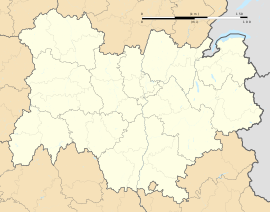Albigny-sur-Saône
Albigny-sur-Saône | |
|---|---|
 The town hall | |
| Coordinates: 45°51′56″N 4°49′56″E / 45.8655°N 4.8321°E | |
| Country | France |
| Region | Auvergne-Rhône-Alpes |
| Metropolis | Lyon Metropolis |
| Arrondissement | Lyon |
| Government | |
| • Mayor (2020–2026) | Yves Chipier[1] |
Area 1 | 2.57 km2 (0.99 sq mi) |
| Population (2022)[2] | 3,013 |
| • Density | 1,200/km2 (3,000/sq mi) |
| Time zone | UTC+01:00 (CET) |
| • Summer (DST) | UTC+02:00 (CEST) |
| INSEE/Postal code | 69003 /69250 |
| Elevation | 167–411 m (548–1,348 ft) (avg. 175 m or 574 ft) |
| 1 French Land Register data, which excludes lakes, ponds, glaciers > 1 km2 (0.386 sq mi or 247 acres) and river estuaries. | |
Albigny-sur-Saône (French pronunciation: [albiɲi syʁ son], literally Albigny on Saône, Arpitan: Arbegnié, before 1962: Albigny)[3] is a commune in the Metropolis of Lyon in Auvergne-Rhône-Alpes region in eastern France. The town was founded thousands of years ago in Roman times, probably around 40 BC over sacred ground of the Gallic Segusiavi tribe, and likely re-named after Clodius Albinus in the early 3rd century AD.
An affluent community the town has two schools, including a Montessori bilingual French-English school, a public library, a church of the Roman Catholic Archdiocese of Lyon, a 12th-century castle, two doctors, two dentists, a pharmacy, and a small shopping centre.
In 2020, Albigny had a population of approximately 3,000.
Surrounding communes
[edit]History
[edit]On 1 January 2015 Albigny-sur-Saône left the department of Rhône to join the Metropolis of Lyon.

Population
[edit]| Year | Pop. | ±% p.a. |
|---|---|---|
| 1968 | 2,506 | — |
| 1975 | 2,405 | −0.59% |
| 1982 | 2,653 | +1.41% |
| 1990 | 2,836 | +0.84% |
| 1999 | 2,673 | −0.66% |
| 2007 | 2,744 | +0.33% |
| 2012 | 2,793 | +0.35% |
| 2017 | 2,880 | +0.62% |
| Source: INSEE[4] | ||
See also
[edit]References
[edit]- ^ "Répertoire national des élus: les maires". data.gouv.fr, Plateforme ouverte des données publiques françaises (in French). 2 December 2020.
- ^ "Populations de référence 2022" (in French). The National Institute of Statistics and Economic Studies. 19 December 2024.
- ^ Décret du 2 mars 1962 portant changement de nom de communes, Journal officiel de la République française n° 0055, 7 March 1962, p. 2308.
- ^ Population en historique depuis 1968, INSEE




